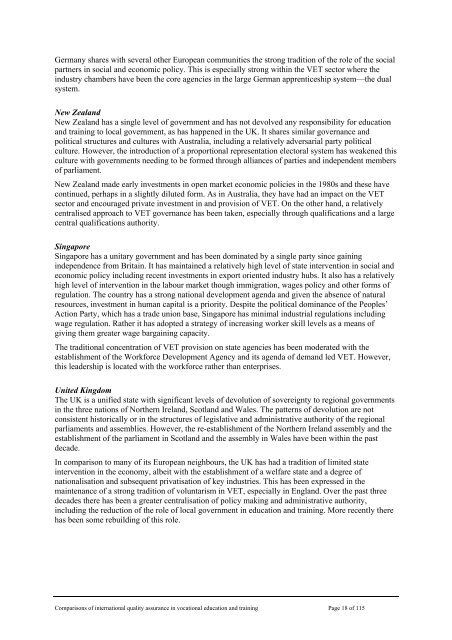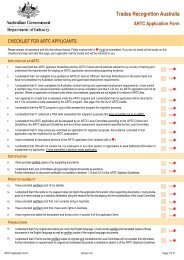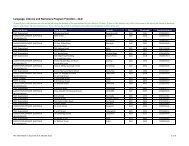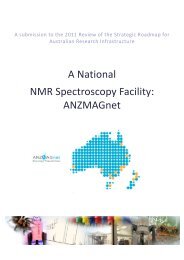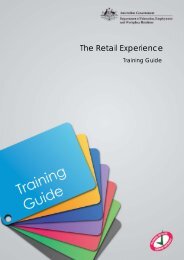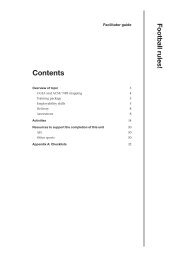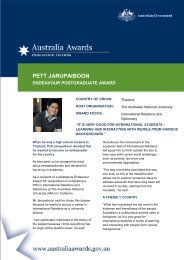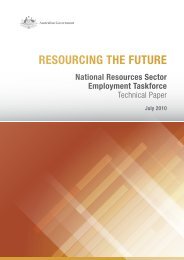Review - Department of Innovation, Industry, Science and Research
Review - Department of Innovation, Industry, Science and Research
Review - Department of Innovation, Industry, Science and Research
You also want an ePaper? Increase the reach of your titles
YUMPU automatically turns print PDFs into web optimized ePapers that Google loves.
Germany shares with several other European communities the strong tradition <strong>of</strong> the role <strong>of</strong> the social<br />
partners in social <strong>and</strong> economic policy. This is especially strong within the VET sector where the<br />
industry chambers have been the core agencies in the large German apprenticeship system—the dual<br />
system.<br />
New Zeal<strong>and</strong><br />
New Zeal<strong>and</strong> has a single level <strong>of</strong> government <strong>and</strong> has not devolved any responsibility for education<br />
<strong>and</strong> training to local government, as has happened in the UK. It shares similar governance <strong>and</strong><br />
political structures <strong>and</strong> cultures with Australia, including a relatively adversarial party political<br />
culture. However, the introduction <strong>of</strong> a proportional representation electoral system has weakened this<br />
culture with governments needing to be formed through alliances <strong>of</strong> parties <strong>and</strong> independent members<br />
<strong>of</strong> parliament.<br />
New Zeal<strong>and</strong> made early investments in open market economic policies in the 1980s <strong>and</strong> these have<br />
continued, perhaps in a slightly diluted form. As in Australia, they have had an impact on the VET<br />
sector <strong>and</strong> encouraged private investment in <strong>and</strong> provision <strong>of</strong> VET. On the other h<strong>and</strong>, a relatively<br />
centralised approach to VET governance has been taken, especially through qualifications <strong>and</strong> a large<br />
central qualifications authority.<br />
Singapore<br />
Singapore has a unitary government <strong>and</strong> has been dominated by a single party since gaining<br />
independence from Britain. It has maintained a relatively high level <strong>of</strong> state intervention in social <strong>and</strong><br />
economic policy including recent investments in export oriented industry hubs. It also has a relatively<br />
high level <strong>of</strong> intervention in the labour market though immigration, wages policy <strong>and</strong> other forms <strong>of</strong><br />
regulation. The country has a strong national development agenda <strong>and</strong> given the absence <strong>of</strong> natural<br />
resources, investment in human capital is a priority. Despite the political dominance <strong>of</strong> the Peoples’<br />
Action Party, which has a trade union base, Singapore has minimal industrial regulations including<br />
wage regulation. Rather it has adopted a strategy <strong>of</strong> increasing worker skill levels as a means <strong>of</strong><br />
giving them greater wage bargaining capacity.<br />
The traditional concentration <strong>of</strong> VET provision on state agencies has been moderated with the<br />
establishment <strong>of</strong> the Workforce Development Agency <strong>and</strong> its agenda <strong>of</strong> dem<strong>and</strong> led VET. However,<br />
this leadership is located with the workforce rather than enterprises.<br />
United Kingdom<br />
The UK is a unified state with significant levels <strong>of</strong> devolution <strong>of</strong> sovereignty to regional governments<br />
in the three nations <strong>of</strong> Northern Irel<strong>and</strong>, Scotl<strong>and</strong> <strong>and</strong> Wales. The patterns <strong>of</strong> devolution are not<br />
consistent historically or in the structures <strong>of</strong> legislative <strong>and</strong> administrative authority <strong>of</strong> the regional<br />
parliaments <strong>and</strong> assemblies. However, the re-establishment <strong>of</strong> the Northern Irel<strong>and</strong> assembly <strong>and</strong> the<br />
establishment <strong>of</strong> the parliament in Scotl<strong>and</strong> <strong>and</strong> the assembly in Wales have been within the past<br />
decade.<br />
In comparison to many <strong>of</strong> its European neighbours, the UK has had a tradition <strong>of</strong> limited state<br />
intervention in the economy, albeit with the establishment <strong>of</strong> a welfare state <strong>and</strong> a degree <strong>of</strong><br />
nationalisation <strong>and</strong> subsequent privatisation <strong>of</strong> key industries. This has been expressed in the<br />
maintenance <strong>of</strong> a strong tradition <strong>of</strong> voluntarism in VET, especially in Engl<strong>and</strong>. Over the past three<br />
decades there has been a greater centralisation <strong>of</strong> policy making <strong>and</strong> administrative authority,<br />
including the reduction <strong>of</strong> the role <strong>of</strong> local government in education <strong>and</strong> training. More recently there<br />
has been some rebuilding <strong>of</strong> this role.<br />
Comparisons <strong>of</strong> international quality assurance in vocational education <strong>and</strong> training Page 18 <strong>of</strong> 115


